Angel investing, once a niche financial endeavor, has now become a cornerstone in the startup ecosystem. High-income professionals increasingly view it as a pathway to not only amplify their wealth but also to have a hand in nurturing the next generation of innovative businesses. This article demystifies the essentials of angel investing, presenting a golden opportunity for professionals to make informed, impactful financial decisions.

Photo by Mario Gogh on Unsplash
Understanding Angel Investing
What is Angel Investing?
- High-Net-Worth Involvement: It involves affluent individuals offering financial support to early-stage companies.
- Equity Exchange: The capital is typically exchanged for equity shares or convertible debt in the startup.
- Early-Stage Engagement: Angel investors often step in during the nascent phase of a startup, a period marked by high risk but also the potential for substantial rewards.
- Differing from Venture Capitalists: Angel investors differ from venture capitalists, as they usually operate individually and are willing to take greater risks by investing at an earlier stage.
The Role of Angel Investors in Startups
- Expertise and Mentorship: Many angel investors are seasoned entrepreneurs or executives themselves, offering a wealth of knowledge and experience.
- Guidance: They can guide startup founders through complex business challenges.
- Strategic Planning: Their experience can be pivotal in strategic decision-making and long-term planning.
- Networking Opportunities: Angel investors often have extensive networks that can open doors for startups.
- Industry Connections: These networks can include potential customers, partners, and even future funders.
- Reputation Building: An endorsement from a well-respected angel investor can significantly enhance a startup’s credibility.
- Operational Support: Besides funding, angel investors might offer hands-on support in areas like:
- Marketing: Crafting effective marketing strategies.
- Product Development: Advising on product design and development.
- Recruitment: Assisting in attracting top talent.
- Risk Mitigation: Their involvement can help mitigate some of the risks inherent in startup ventures.
Through this detailed exploration in our “Angel Investing Guide,” readers can gain a comprehensive understanding of the multifaceted role of angel investors in the startup ecosystem. This knowledge is crucial for both prospective investors and entrepreneurs looking to navigate the world of angel investing successfully.
Getting Started with Angel Investing in the Angel Investing Guide
Steps to Begin as an Angel Investor
- Industry Research:
- Identify Areas of Interest: Focus on industries where you have expertise or a strong interest.
- Stay Informed: Keep up with the latest trends and developments in these sectors.
- Market Trends Understanding:
- Market Analysis: Study market reports and forecasts to understand where growth is occurring.
- Emerging Technologies: Keep an eye on new technologies that could disrupt traditional markets.
- Networking:
- Join Investor Groups: Connect with local or online angel investor networks.
- Attend Startup Events: Participate in startup pitches and networking events to meet entrepreneurs and co-investors.
- Educational Investment:
- Workshops and Seminars: Attend workshops to learn about the nuances of angel investing.
- Online Resources: Utilize online courses and webinars focused on angel investing strategies.
Assessing Risk and Potential in Startups
- Founding Team Analysis:
- Experience and Skillset: Assess the background and expertise of the founders.
- Commitment Level: Gauge their dedication and passion for the project.
- Business Model Evaluation:
- Sustainability: Look at the long-term viability of the business model.
- Scalability: Consider if the business can grow without proportional increases in costs.
- Market Size and Growth Potential:
- Target Market: Understand the size and demographics of the target market.
- Growth Opportunities: Identify potential for expansion and scaling.
- Risk Assessment:
- Financial Risks: Evaluate the financial stability and funding needs of the startup.
- Market Risks: Consider external factors like competition and market volatility.
- Legal and Compliance Checks:
- Due Diligence: Conduct thorough due diligence to uncover any legal or compliance issues.
- Intellectual Property: Ensure the startup has clear rights to its intellectual property.

The Financial Implications in the Angel Investing Guide
Understanding Financial Commitment and Returns
- Long-Term Investment Horizon:
- Patience is Key: It’s important to understand that returns on angel investments typically take several years to realize.
- Exit Strategies: Familiarize yourself with various exit strategies, such as acquisitions or IPOs, which can affect the timing and magnitude of returns.
- Risk-Reward Ratio:
- High Risk, High Reward: Be prepared for the possibility of losing your entire investment, but also the potential for outsized returns if a startup succeeds.
- Portfolio Approach: Diversify your investments across different startups and industries to spread risk.
- Investment Sizing:
- Capital Allocation: Determine the amount of capital you are willing to allocate to angel investing, considering it as a part of your broader investment portfolio.
- Follow-on Investments: Decide in advance if you will make follow-on investments in subsequent funding rounds.
Tax Implications and Benefits
- Tax Advantages:
- Potential Deductions: Depending on your jurisdiction, you may be eligible for tax deductions or credits for investing in startups.
- Capital Gains Tax: Familiarize yourself with how capital gains tax applies to your returns from angel investing.
- Tax Planning Strategies:
- Consult Professionals: Work with tax professionals to understand and navigate the complex tax landscape of angel investing.
- Keeping Records: Maintain thorough records of all your investments for accurate tax reporting.
- Loss Write-offs:
- Handling Investment Losses: In some cases, losses from angel investments can be written off against other capital gains, which is an important consideration in managing investment risks.
Building a Diverse Portfolio in the Angel Investing Guide
Strategies for Diversifying Investments
- Industry Diversification:
- Spread Investments Across Sectors: Avoid concentration in a single industry. Invest in a mix of sectors like technology, healthcare, green energy, etc., to spread risk.
- Emerging Markets: Consider opportunities in emerging markets or industries poised for growth.
- Stage Diversification:
- Mix of Early and Late Stage Startups: Invest in startups at different stages of development. While early-stage startups offer higher potential returns, later-stage startups may present lower risk.
- Understanding Lifecycle Stages: Familiarize yourself with the unique risks and benefits at each stage of a startup’s lifecycle.
Balancing High-risk and Stable Investments
- Risk Assessment:
- Evaluate Risk Tolerance: Understand your personal risk tolerance. This will influence your investment choices between high-risk, potentially high-reward startups, and more stable, lower-return ones.
- Risk Management Strategies: Use risk management techniques like portfolio caps on high-risk investments to avoid overexposure.
- Stable Investment Inclusion:
- Incorporating Lower-Risk Startups: Include startups with a proven track record or steady revenue streams as a part of your portfolio for stability.
- Sector Stability: Invest in sectors known for resilience or steady growth, like healthcare or education technology.
- Regular Portfolio Review:
- Assess Performance: Periodically review your portfolio’s performance to ensure it aligns with your investment goals.
- Adjustment Strategy: Be prepared to adjust your strategy based on market changes and new information.

Photo by Firmbee.com on Unsplash
Networking and Community Involvement in the Angel Investing Guide
Joining Investor Networks
Becoming part of a network is crucial for new and experienced angel investors alike:
- Finding the Right Networks:
- Local and Global Networks: Look for both local investor groups and broader networks that align with your investment interests and goals.
- Online Platforms: Utilize online platforms and social media groups dedicated to angel investing.
- Active Participation:
- Regular Attendance: Regularly attend meetings and events to stay informed and visible within the community.
- Contributing Expertise: Share your knowledge and experiences with others, which can help build your reputation as a knowledgeable investor.
Participating in Startup Events
Engaging with the startup community is equally important:
- Startup Pitch Events:
- Discovering New Ventures: Attend pitch events to discover new and exciting startups seeking funding.
- Firsthand Evaluation: These events allow you to assess the founders and their pitches in person.
- Industry Conferences and Seminars:
- Broader Insights: Participate in conferences related to your areas of interest to gain broader industry insights.
- Networking Opportunities: Use these events to network with both startups and fellow investors.
Leveraging Community Involvement
Community involvement can be a powerful tool for angel investors:
- Mentorship Opportunities:
- Mentoring Startups: Offer your expertise to startups, which can provide you with deeper insights into potential investments.
- Learning From Peers: Engage in mentorship opportunities within the investor community to learn from more experienced investors.
- Building Long-term Relationships:
- Trust and Reputation: Foster long-term relationships within the community, which can lead to trust and a strong reputation.
- Collaborative Investments: These relationships can lead to collaborative investment opportunities and shared due diligence efforts.
Conclusion
Angel investing offers a unique blend of financial reward and personal satisfaction. By understanding the essentials and embracing the journey, high-income professionals can play a pivotal role in fueling startups and shaping the future of innovation.
Photo by bruce mars on Unsplash
This article is brought to you by the wizard behind the scenes with 23 years of experience, Dan Dillard. Of course with his workshop of helpers including some handy hi-tech sourcing.
If you’re finding it challenging to stay on top of all the changes, connect with our financial planning professionals by scheduling a no-obligation call. At NEST Financial, we can help make crypto not quite so cryptic.
Find us on:
LinkedIn Facebook Yelp Twitter
If you like reading more entrepreneurial stories In Austin check out Dan’s other company foundingAustin. If you are into podcasts click here.
DISCLAIMER: We are legally obligated to remind you that the information and opinions shared in this article are for educational purposes only. These are not financial planning or investment advice. For guidance about your unique goals, drop us a line at info@nestfinancial.net


